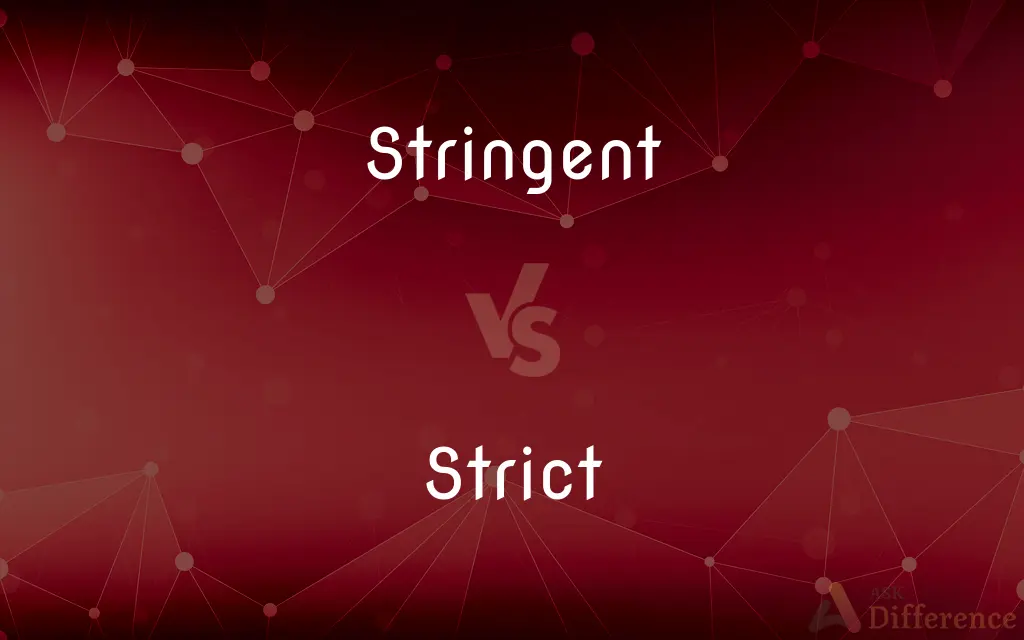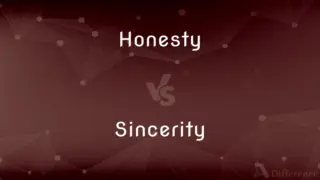Stringent vs. Strict — What's the Difference?
By Fiza Rafique & Urooj Arif — Updated on April 1, 2024
Stringent implies regulations or conditions that are rigorously binding or exacting, while strict refers to an uncompromising adherence to rules.

Difference Between Stringent and Strict
Table of Contents
ADVERTISEMENT
Key Differences
Stringent is often used to describe regulations or standards that are very tight and leave little room for flexibility, emphasizing the rigorous nature of these requirements. Strict, on the other hand, describes an attitude or approach that is inflexible and uncompromising, focusing more on the manner of enforcement than the specifics of the rules themselves.
In legal and regulatory contexts, stringent measures are typically associated with the thoroughness and severity of laws or guidelines, aimed at ensuring high levels of compliance and safety. Whereas, strict enforcement speaks to the rigor and seriousness with which any set of rules or standards, stringent or otherwise, is applied, highlighting the discipline and control exercised by authorities or individuals.
While stringent conditions may be imposed by external factors such as laws, regulations, or situations necessitating tight control, being strict is more about an individual's or entity's approach to rules, discipline, and order, regardless of external pressures. This distinction underscores the difference between external impositions and internal dispositions toward rule adherence.
For instance, a company may adopt stringent security protocols to comply with industry regulations, involving detailed and specific measures to protect data. A strict manager, however, refers to someone who rigorously enforces workplace rules, regardless of whether those rules are inherently stringent or not, focusing on adherence and discipline.
While both terms imply a degree of rigor, the context and application differ: stringent emphasizes the rigorous nature of the rules or conditions themselves, while strict focuses on the rigorous manner of applying or adhering to these rules. This nuanced difference highlights the broader implications of each term in various professional and personal contexts.
ADVERTISEMENT
Comparison Chart
Definition
Implies regulations or conditions that are rigorously binding or exacting.
Refers to an uncompromising adherence to rules or standards.
Focus
On the nature of rules or conditions.
On the manner of enforcement or adherence.
Application Context
Often used in legal, regulatory, or policy contexts.
More broadly applicable, including personal discipline.
Flexibility
Typically allows little to no flexibility.
May be applied with varying degrees of flexibility, depending on the enforcer.
Implication
Suggests external imposition of rules.
Indicates personal or organizational discipline.
Compare with Definitions
Stringent
Severity in requirements.
Stringent safety protocols were implemented following the accident.
Strict
Rigorous enforcement.
The teacher is known for his strict grading policy.
Stringent
High standards of compliance.
The new law imposes stringent penalties for non-compliance.
Strict
Disciplined approach.
Strict routines are key to their team's success.
Stringent
Necessitated by external factors.
Stringent environmental laws were enacted in response to climate change.
Strict
Flexibility varies by enforcer.
Although the rules are strict, some teachers apply them more leniently.
Stringent
Rigorously binding.
The stringent regulations require all products to pass multiple safety tests.
Strict
Uncompromising adherence.
Her strict adherence to the diet contributed to her health improvement.
Stringent
Little to no flexibility.
Stringent guidelines ensure strict adherence to ethical standards in research.
Strict
Focus on discipline and control.
Strict parents often enforce curfews and rules about screen time.
Stringent
Imposing rigorous standards of performance; severe
Stringent safety measures.
Strict
In mathematical writing, the term strict refers to the property of excluding equality and equivalence and often occurs in the context of inequality and monotonic functions. It is often attached to a technical term to indicate that the exclusive meaning of the term is to be understood.
Stringent
Constricted; tight
Operating under a stringent time limit.
Strict
Demanding that rules concerning behaviour are obeyed and observed
A strict upbringing
My father was very strict
Stringent
Characterized by scarcity of money, credit restrictions, or other financial strain
Stringent economic policies.
Strict
(of a person) following rules or beliefs exactly
A strict vegetarian
Stringent
; binding strongly; making strict requirements; restrictive; rigid; severe
They have stringent quality requirements outlining what is acceptable.
Strict
Exact in correspondence or adherence to something; not allowing or admitting deviation or relaxation
A strict interpretation of the law
Stringent
Binding strongly; making strict requirements; restrictive; rigid; severe; as, stringent rules.
They must be subject to a sharper penal code, and to a more stringent code of procedure.
Strict
Rigorous in the imposition of discipline
A strict parent.
Stringent
Demanding strict attention to rules and procedures;
Rigorous discipline
Tight security
Stringent safety measures
Strict
Conforming completely to established rule, principle, or condition
A strict vegetarian.
Strict
Requiring close observance or demanding in expectations
Strict standards.
Strict
Carefully maintained or observed
Strict silence.
Strict loyalty.
Strict
Not loose or vague; exact or precise
A strict definition.
Strict
(Botany) Stiff, narrow, and upright.
Strict
Strained; drawn close; tight.
Strict embrace
Strict ligature
Strict
Tense; not relaxed.
Strict fiber
Strict
Exact; accurate; precise; rigorously particular.
To keep strict watch
To pay strict attention
Strict
Governed or governing by exact rules; observing exact rules; severe; rigorous.
They are very strict in observing the Sabbath
Strict
Rigidly interpreted; exactly limited; confined; restricted.
To understand words in a strict sense
Strict
(botany) Upright, or straight and narrow; — said of the shape of the plants or their flower clusters.
Strict
Severe in discipline.
Our teacher was always very strict. If we didn't behave, we would get punished.
It was a very strict lesson.
Strict
Irreflexive; if the described object is defined to be reflexive, that condition is overridden and replaced with irreflexive.
Strict
Strained; drawn close; tight; as, a strict embrace; a strict ligature.
Strict
Tense; not relaxed; as, a strict fiber.
Strict
Exact; accurate; precise; rigorously nice; as, to keep strict watch; to pay strict attention.
It shall be still in strictest measure.
Strict
Governed or governing by exact rules; observing exact rules; severe; rigorous; as, very strict in observing the Sabbath.
Strict
Rigidly; interpreted; exactly limited; confined; restricted; as, to understand words in a strict sense.
Strict
Upright, or straight and narrow; - said of the shape of the plants or their flower clusters.
And rules as strict his labored work confine,As if the Stagirite o'erlooked each line.
Soon moved with touch of blame, thus Eve: -"What words have passed thy lips, Adam severe!"
Strict
(of rules) stringently enforced;
Hard-and-fast rules
Strict
Rigidly accurate; allowing no deviation from a standard;
Rigorous application of the law
A strict vegetarian
Strict
Incapable of compromise or flexibility
Strict
Not indulgent;
Strict parents
Strict
Unsparing and uncompromising in discipline or judgment;
A parent severe to the pitch of hostility
A hefty six-footer with a rather severe mien
A strict disciplinarian
A Spartan upbringing
Strict
Severe and unremitting in making demands;
An exacting instructor
A stern disciplinarian
Strict standards
Common Curiosities
What does strict mean?
Strict denotes an uncompromising adherence to rules, regulations, or standards, focusing on discipline and control.
How do stringent policies differ from strict enforcement in a workplace?
Stringent policies refer to the specific, tight regulations a workplace must follow, while strict enforcement is about how rigorously these policies are applied by management.
Is being strict always negative?
Being strict is not inherently negative; it can reflect a commitment to high standards and discipline, leading to positive outcomes in various contexts.
What does stringent mean?
Stringent refers to conditions or regulations that are strictly binding and allow little room for flexibility, often in a legal or regulatory context.
How does one balance stringent rules with the need for innovation?
Balancing stringent rules with innovation requires creating an environment where creativity is encouraged within the boundaries of necessary regulations.
What makes a rule stringent?
A rule is considered stringent if it is strictly defined, leaves little room for interpretation, and requires strict compliance.
Why is flexibility mentioned in the context of strictness?
Flexibility is mentioned to highlight that strict enforcement can vary in its rigidity depending on the person or entity enforcing the rules.
How does culture impact perceptions of strictness and stringency?
Cultural norms and values can greatly influence how strictness and stringency are perceived, with some cultures valuing rigid adherence to rules more than others.
Can someone be described as stringent?
Typically, "stringent" describes rules or conditions, not individuals. However, one might refer to an individual's standards or expectations as stringent in a metaphorical sense.
Can a law be both stringent and enforced strictly?
Yes, a law can be stringent in its requirements and also be enforced in a strict manner, ensuring high levels of compliance.
Why might an individual favor strict routines?
Strict routines can provide structure and predictability, which many find conducive to productivity and personal well-being.
Can a company's culture be both stringent and strict?
Yes, a company can have stringent policies (tight regulations and standards) and also maintain a strict culture (rigorous enforcement and discipline).
Can strict parenting affect children's creativity?
Yes, overly strict parenting can sometimes stifle creativity, but it can also provide a structure that fosters discipline and focus.
How do organizations ensure compliance with stringent regulations?
Organizations ensure compliance through thorough training, regular audits, and by fostering a culture of adherence to these regulations.
Is it better to be strict or lenient in education?
The effectiveness of being strict versus lenient varies and depends on the context, students’ needs, and educational goals.
Share Your Discovery

Previous Comparison
Husband vs. Wife
Next Comparison
Honesty vs. SincerityAuthor Spotlight
Written by
Fiza RafiqueFiza Rafique is a skilled content writer at AskDifference.com, where she meticulously refines and enhances written pieces. Drawing from her vast editorial expertise, Fiza ensures clarity, accuracy, and precision in every article. Passionate about language, she continually seeks to elevate the quality of content for readers worldwide.
Co-written by
Urooj ArifUrooj is a skilled content writer at Ask Difference, known for her exceptional ability to simplify complex topics into engaging and informative content. With a passion for research and a flair for clear, concise writing, she consistently delivers articles that resonate with our diverse audience.














































